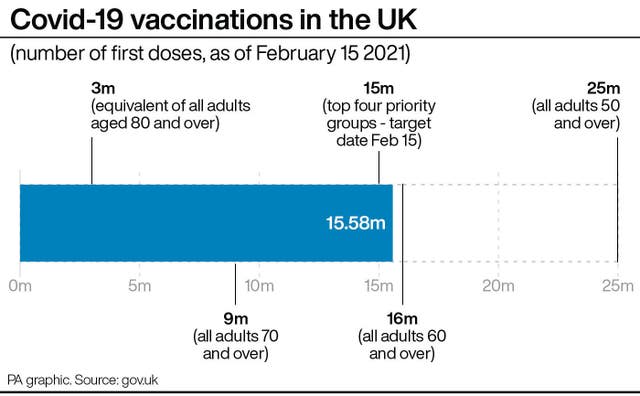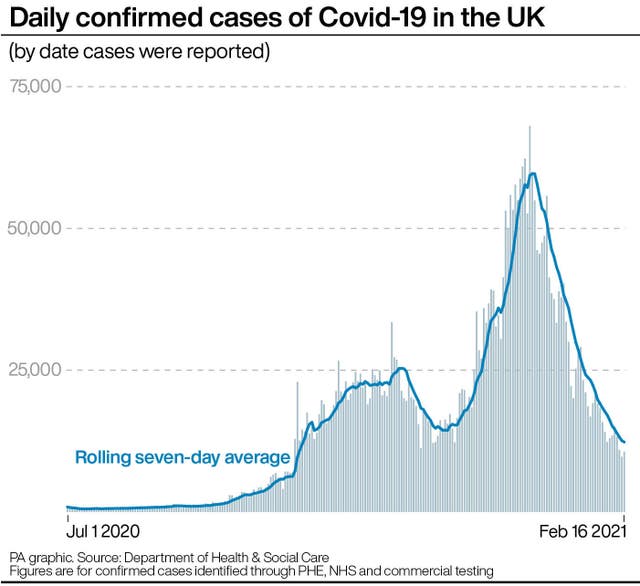Almost two million more people are to be told to shield to protect themselves from serious side-effects from Covid-19, officials have said.
A new tool has identified those who are at high risk of severe disease or death.
As a result, 1.7 million additional people in England will be sent letters asking them to shield.
Around 2.2 million people are currently on the list in England, which will expand to almost four million when the additional people are included.
More than 800,000 of these are aged 19 to 69 and will be prioritised for the vaccination programme, the Department of Health and Social Care confirmed.
The current shielding list includes people with single risk factors such as those with various cancers, people on immunosuppression drugs or those with severe respiratory conditions.
But as the pandemic has progressed, medics have found that some people are at higher risk than others because they have multiple risk factors.
Using medical records, the new tool assesses which people are at higher risk based on multiple factors including age, ethnicity, body mass index (BMI), other health conditions and also postcode, which is indicative of levels of deprivation.
Dr Jenny Harries, deputy chief medical officer for England, said the 1.7 million, if they join the list, will receive the additional support available to those deemed to be clinically extremely vulnerable, including medicine deliveries, priority slots for supermarkets and statutory sick pay.
“All of these people who are identified for the first time are those who have not had an individual clinical condition that we’ve previously been able to identify through the clinically extremely vulnerable group, but they are people who have multiple personal risk factors and underlying health conditions which move them into a higher risk group,” she said.
Dr Harries said the approach was “risk averse” to “protect as many people as possible”.
Officials will be advising that shielding continues until March 31.
It comes as new evidence suggests that the Covid-19 vaccination programme is working as increasing numbers of people are showing protective antibodies in their blood.
Antibodies – disease fighting proteins made by the body’s immune system – are present in a person’s blood when they have built up some level of immunity through a previous infection or have received a vaccine.
New Office for National Statistics (ONS) data show an increasing proportion of people across the UK have antibodies in their blood.
An estimated one in five adults in England have antibodies, compared with one in seven in Wales and Northern Ireland, and an estimated one in nine in Scotland.
Antibodies can take a couple of weeks after vaccination to show up.
So those vaccinated first – including those over the age of 80 – will be among the first to show antibodies through blood tests.
In England, 40.9% of people aged 80 and over tested positive for antibodies. In Wales the figure was 12.7% and in Scotland 11.6%.

Meanwhile, vaccines minister Nadhim Zahawi said preliminary evidence on the effect of vaccines on coronavirus transmission is “really encouraging” but suggested the full data may not be available for weeks.
In other developments:
– Separate ONS data show the number of weekly registered deaths involving coronavirus in England and Wales has fallen for the first time since Christmas.
– But figures also show that more than 1,000 Covid-19 deaths occurred each day for 23 days in a row in the UK in January.
– Scientists have identified another new variant of coronavirus which has potentially concerning mutations. Public Health England has identified 38 cases of “variant under investigation” known as B.1.525.
– First Minister Nicola Sturgeon announced that some pupils in Scotland will return to school from February 22 but the stay-at-home lockdown order will continue until at least the beginning of March and possibly longer.
– Surge testing will be deployed in parts of Norfolk, Southampton and Woking, Surrey, where the South African Covid-19 variant has been found, and expanded in Manchester.
Mr Zahawi said early research from Oxford University has been promising but cited “two big studies” on the impact of vaccines on Covid-19 – the Vivaldi study on care home residents and staff, and the Siren research on healthcare workers – as being important.
“We’ve got to make sure that you bring down the infection rates, hence why we’re waiting to see the data on transmission. The Oxford team had some early data which is really encouraging on transmission, which has to be peer-reviewed,” Mr Zahawi told Times Radio.
But he stressed it is currently uncertain how much of the reduction in infections being seen is down to lockdown restrictions or the vaccine rollout, and suggested the full research may not be available for a number of weeks.
“We have a couple of very large-scale studies related to giving us better data on the vaccines,” Mr Zahawi told BBC Radio 4’s Today programme.
“We should be able to see really good data in the next few weeks from those studies.”

The PA news agency was told there are hopes the Siren and Vivaldi studies will return data on the impact of vaccines on transmission by the end of the month but that timeframe cannot be guaranteed.
Oxford University research, which is yet to be peer-reviewed, has suggested the vaccine it developed along with AstraZeneca may reduce transmission by 67%, while Health Secretary Matt Hancock has pointed to promising signs from Israel, which has an advanced vaccine rollout.
But Mr Zahawi told Times Radio: “We’re beginning to see more and more data but at the moment it’s far too early to begin to speculate on the quality of the data.”
He said vaccine supplies at the moment are “finite” but expressed confidence that the Government will reach its next target of vaccinating another 17 million people, including all over-50s and those in at-risk groups, by the end of April.
“I see much greater volume in March and April – tens of millions of doses coming through – and I’m confident that we’ll hit our target,” he told BBC Breakfast.
Prime Minister Boris Johnson has said he wants the current national lockdown to be the last – and for the unlocking to be “irreversible” – ahead of the publication of his “road map” on Monday.
Mr Johnson will analyse data this week on coronavirus case numbers, hospital admissions, deaths and the impact of the vaccine rollout as he prepares his plan to reduce restrictions.




Comments: Our rules
We want our comments to be a lively and valuable part of our community - a place where readers can debate and engage with the most important local issues. The ability to comment on our stories is a privilege, not a right, however, and that privilege may be withdrawn if it is abused or misused.
Please report any comments that break our rules.
Read the rules here